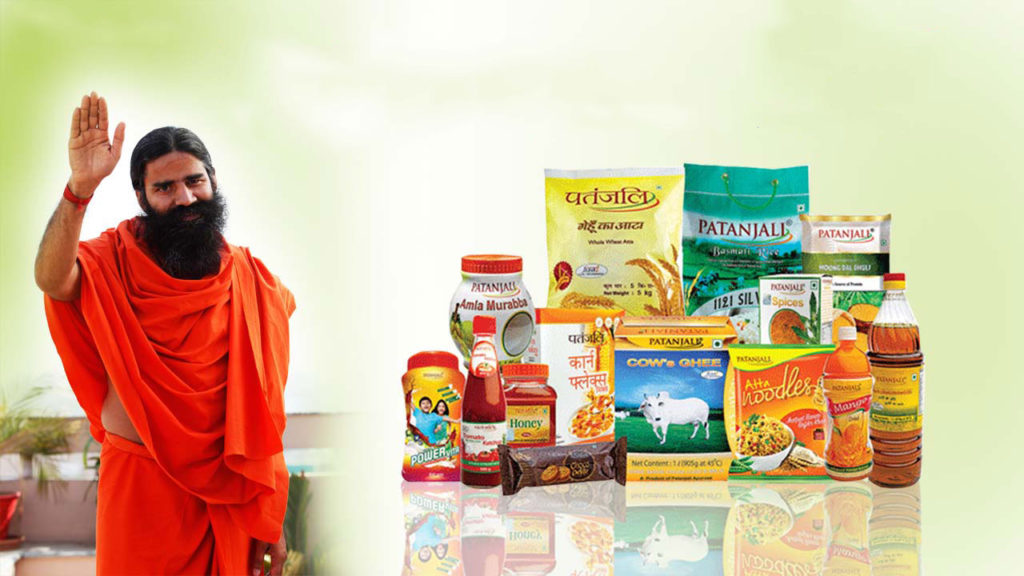From a spiritual guru to an ace businessman, Baba Ramdev has surely come a long way. Patanjali, the FMCG venture of Baba Ramdev, is today one of the biggest players in the sector in India.
The yoga-guru, which has a massive follower base, said that he has set a target of Rs 20,000 crore to Rs 25,000 crore turnover in 3-5 years. Ramdev wants to beat HUL which is at the top with sale of over Rs 30,000 crore.
Baba Ramdev along with Acharya Balakrishnan started their FMCG in 1990 with the Divya Yog Pharmacy Trust. Till 2011, the company’s turnover was just Rs 400 crore. However, in last few years, it rose exponentially and created its own niche in the Indian sector.
However, it seems not only HUL, this Baba is all set to give a tough competition to WhatsApp, and Indian-origin Mukesh Ambani’s Reliance JIO.
Baba forayed into the telecom sector this week, by launching ‘Swadeshi Samriddhi’ SIM card in partnership with BSNL (Bharat Sanchar Nigam Limited). Not only this, Patanjali launched Kimbho app to compete with WhatsApp messaging network.
Take a look at how this Baba started his entrepreneurial journey…
Telecom Sector:
Patanjali launched ‘Swadeshi Samriddhi’ SIM card in partnership with BSNL. These cards can be availed from five lakh counters of BSNL.
During the initial period, only Patanjali employees will be able to avail the benefits of the SIM card. After its full-fledged launch, over the coming months, ordinary citizens will be able to get discount of 10 per cent on Patanjali products with the SIM.
Not only this, consumers will also get health, accidental and life insurance on the Swadeshi SIM card. Baba Ramdev said that in addition to attractive data and call package, the card also comes with Rs 2.5 lakh medical and Rs 5 lakh life insurance cover. However, there’s a clause, the cover can only be availed in the case of road accident.
Messaging Platform:
Ramdev’s Patanjali launched a new swadeshi messaging application called Kimbho to compete with WhatsApp.
Kimbho caters to private and group chats with free phone and video calling. The application has dozens of features to share text, audio, photos, videos, stickers, quickies, location, GIFs, and doodle, according to its brief on the Google Play Store. With a total desi feel, the tagline of Kimbho says “Ab Bharat Bolega”.
However, Patanjali has withdrawn its messaging app Kimbhu within a day of the test run on May 30. The company spokesperson said that the app will be launched with all technical matters fixed.
Clothing Segment:
Baba Ramdev’s company would foray into the garment manufacturing business next year. Patanjali is preparing to launch its ‘swadeshi” line of clothes for men, women and children.
Patanjali will have different products in each category—value-for-money clothes for the masses and apparel that would have the snob value meant for the classes. The company will start with woven clothes, knitwear and machine-made apparel, including denims.
In addition, Ramdev will also launched garments for sports and yoga.
According to media report, Raymond is keen to tie up with Patanjali for garments and clothing.
Footwear Segment:
According to media report, the company is also planning to launch its footwear brand called Paridhan.
Hospitality Chain:
Yoga teacher Ramdev is cooking up a recipe to take on multinational fast food chains, including KFC, McDonald’s and Subway. Last year, Ramdev told TOI that he is working on launching a quick service restaurant (QSR) chain across the country that will offer 400 recipes.
Ramdev said he is also looking to open his restaurants in international markets.
Bio-compost plans:
The company is also focusing in a big way on the bio-compost segment in a bid to counter the impact of insecticides and pesticides on soil health.

Value-added dairy products:
The company’s cow ghee is now a Rs 1,000 crore-plus brand.
Acharya Balkrishna, CMD of Patanjali Ayurveda, told Business Line: “In the dairy segment we are taking our efforts forward through our plant at Newasa in Ahmednagar district of Maharashtra. We are in the process of setting up a milk collection centre there and our target is now to make other dairy products at that plant.”
He was speaking on the sidelines of the AIMA Managing India Awards 2018 event, where he received the Transformational Business Leader of the Year award.
Solar Equipment Business:
Baba Ramdev-backed fast-moving consumer goods company Patanjali Ayurveda is looking to venture into solar equipment manufacturing, Mint reported.
“Getting into solar is in line with the Swadeshi movement. With solar, each household in India can have power supply,” Acharya Balkrishna, managing director of Patanjali Ayurveda, told the financial daily.
Patanjali is looking to invest around Rs 100 crore in solar equipment manufacturing.
The Pre-Existing Segments – Ayurveda, Food, and Cosmetics:
Manufacturing units and headquarters are located in the industrial area of Haridwar while the registered office is located at Delhi.
The company manufactures mineral and herbal products. It also has manufacturing units in Nepal under the trademark Nepal Gramudhyog. Patanjali declared its annual turnover of the year 2016-17 to be estimated Rs 10,216 crore (US$1.6 billion). Baba Ramdev has stated in his interview with CNN-News18 that profit from Patanjali Products goes to charity.
Patanjali produces products in the categories of personal care and food. The company manufactures more than 900 products including 45 types of cosmetic products and 30 types of food products such as biscuits, toothpaste, honey etc. According to Patanjali, all the products manufactured by Patanjali are made from Ayurveda and natural components.
Patanjali has also launched beauty and baby products. Patanjali Ayurvedic manufacturing division has over 300 medicines for treating a range of ailments and body conditions, from common cold to chronic paralysis.
Patanjali launched instant noodles on 15 November 2015. Food Safety and Standards Authority of India slapped a notice on the company as neither Patanjali nor Aayush, which are the two brand names under which Patanjali got licenses, have got any approval for manufacturing instant noodles.
On November 2016, Patanjali announced that it will set up a new manufacturing plant Patanjali Herbal and Mega Food Park in Balipara, Assam by investing Rs 1,200 crore.
Patanjali’s top five products, in terms of revenue include cow ghee, dant kanti toothpaste, ayurvedic medicines, keshkanti shampoo and soaps.
Below are Patanjali’s top five products:
- Cow’s Ghee — Patanjali earned a revenue of Rs 1,467 crore. Its rival is Amul.
- Dant Kanti toothpaste — Dantkanti toothpaste earned a revenue of Rs 940 crore from the segment. The company said its share in market stood at 14 percent at the end of March. Rivals include Colgate Palmolive India and Dabur India.
- Ayurvedic medicines — Patanjali earned Rs 870 crore revenue from ayurvedic medicines. Its direct rival is Dabur India.
- Keshkanti shampoo– It contributed a revenue of Rs 825 crore for Patanjali. Rival being the industry leader Hindustan Unilever.
- Soaps — Patanjali’s herbal soap segment mopped up a revenue of Rs 574 crore. The leader HUL, being the competitor, include products such as Lifebuoy.
(Data compiled from the Economic Times article dated January 19)
Online Presence:
Patanjali announced a partnership with eight major players — Amazon, Flipkart, Grofers, Shopclues, BigBasket, 1mg, Paytm Mall and Netmeds to sell its goods online in January, with a targeted revenue of over Rs 10000 million crore within the year.
It has also teamed up with JHS Svendgaard Laboratories, a manufacturer of oral care products, to set up exclusive Patanjali stores at airports across the country.
There’s no stopping for this godman! With all these, Baba Ramdev is all set to conquer the world with Patanjali products.



